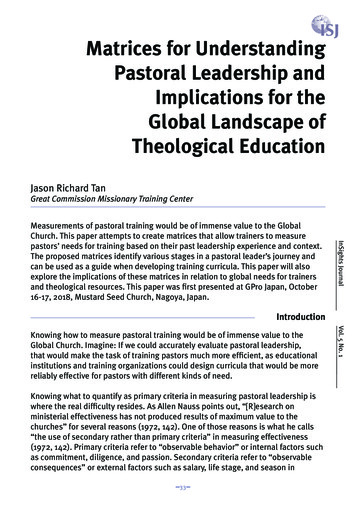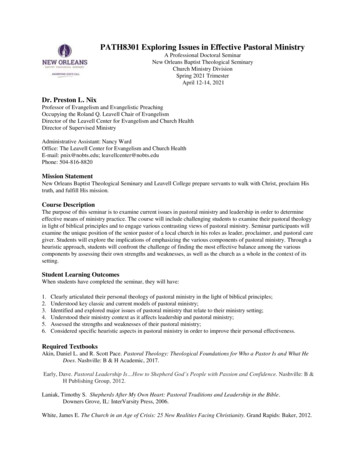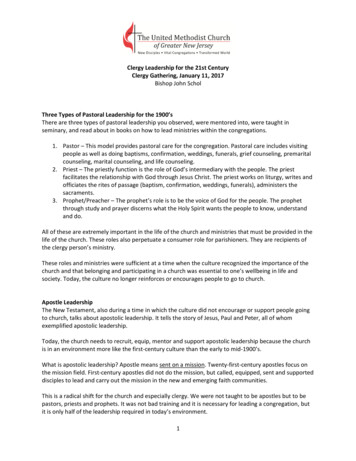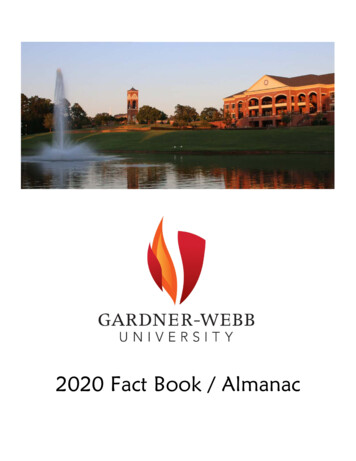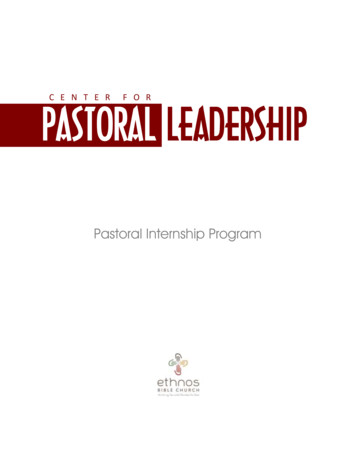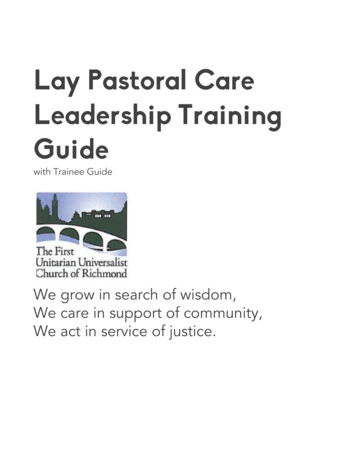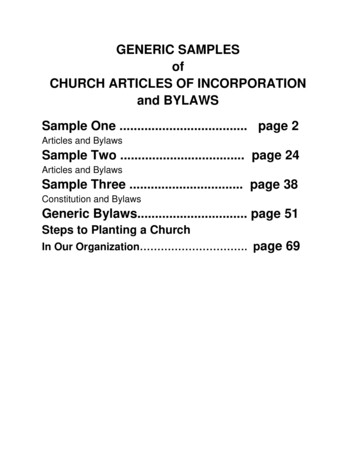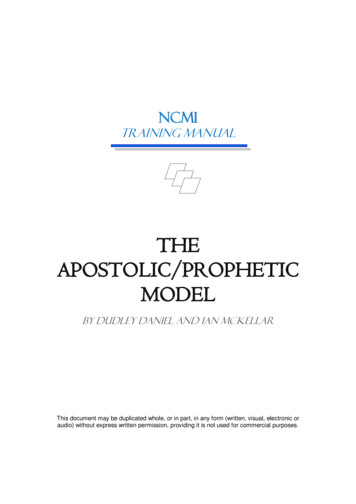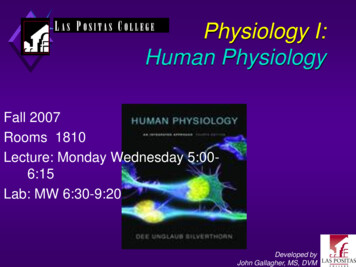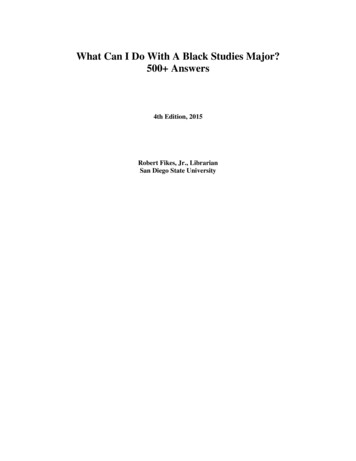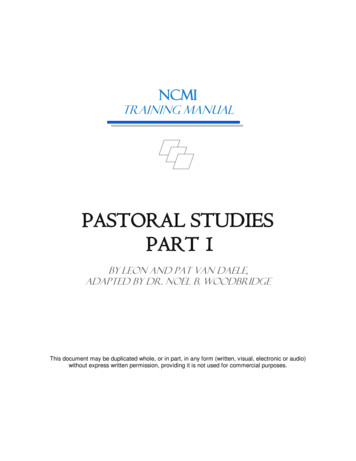
Transcription
NCMITRAINING MANUALPASTORAL STUDIESPART 1By Leon and Pat Van Daele,adapted by Dr. Noel B. WoodbridgeThis document may be duplicated whole, or in part, in any form (written, visual, electronic or audio)without express written permission, providing it is not used for commercial purposes.
PREFACE TO THE COURSEWriting a course on the subject of pastoring the Flock of God, at this point in the historyof the Church, is both a privilege and an enormous responsibility. We live in times ofaccelerated reformation, formation and change in the Church of Jesus Christ.Accelerating change on a global scale has gripped the attention of the world. Theexplosion of science and technology is demanding a degree of alertness and flexibilitynever before experienced by man. God will not be left behind. He has already been tothe end and declared it from the beginning (Isa. 46:10). Where His Church is in stepwith Him, she finds herself in constant transition and change. He wants a church thatwill be abreast of world trends and relevant to the people in the street. Increasingrevelation concerning His strategies as well as a fuller understanding of Truth isnecessary. This is being experienced by many of His people today. It is necessary tokeep the Church on the “cutting edge” of History. Writing in this context makes one feelvery vulnerable. On our shelves are many books written by those who have bothachieved more for God and had better minds than some of us. However, one is awarethat “that was then, and this is now.” Significant and far-reaching changes are takingplace in our understanding of the nature of the Church. There is a keen awareness that,although we can see more than we did before, we are still only scratching the surface ofthe profound “mystery” (Eph. 5:32) of the nature of the Church. Thus after havingcommitted our understanding to paper, how much more will we understand in the nearfuture? May we, therefore, urge those who study this material to avoid the danger ofconcluding that this is the last word on the subject. Rather, as we should do with allTruth, let us hold fast to what we have, while we keep our eyes, heads and hearts wideopen for the ongoing work of the Holy Spirit as He “. guides (us) into all truth ” (John16:13). The day will come when this material may no longer adequately serve thepurpose for which it was written.With respect to those who are taken up with being “politically correct” we make noapology for using the language of the Bible in terms of gender. “Man” is often used todenote the whole human race and is not intended to perpetrate a sexist point of view.We write in the light of the Biblical principle that while there are distinctive roles laiddown by the Almighty for men and women, at the same time “. there is neither Jew norGreek, slave nor free, male nor female, for you are all one in Christ Jesus” (Gal. 3:28).2
UNIT ONETHE BIBLICAL MODEL OF THE LOCAL CHURCH“BE SHEPHERDS OF GOD‟S FLOCK . ”(1 Peter 5:2)Learning Outcomes:After completing this unit you should be able to:(1)(2)(3)(4)1.1Recognise the importance of the local church in the achievement of the GreatCommission.Understand the Biblical model of the local church.Compare the organisational life of the church with its organic life(i.e. the Covenant Family relationship).Understand the nature of the organic life of God.ACHIEVING THE GREAT COMMISSION THROUGH THE LOCALCHURCHMany different techniques have been tried through the years to grow Christianchurches. Some have produced spectacular results for a short period only to slowly losethe increase. Others have held their numbers for a time only to discover that they hadmerely attracted a large number of people, who eventually left in search of otherattractions. They were never integrated into the life of the church. Others experiencedthe damaging results of having large numbers of immature Christians who eventuallyfall prey to in-house divisions, splits and breakaways. Many just muddle along for yearswithout zeal or direction and eventually disappear leaving the world to take over theirbuildings for barns, for businesses and bars!Most of the aforementioned scenarios were due to the neglect, to some extent, of abasic principle Jesus gave His disciples. This principle was embodied in the simplewords of the Great Commission: “teaching them to obey everything I havecommanded you” (Matt 28:20).3
The Great CommissionRead Matthew 28:18-20 and then answer the following questions:1. What three-fold task did Jesus give to the Christian church?2. What did Jesus promise His disciples regarding His power and His presence, inorder to assist them with their missionary task?Read John 20:21-23 and then fill in the missing words/phrases.3. Outline the commission as portrayed in this passage under the following headings:(1) Orientation:“As . .”(2) Commissioning:“I am . .”(3) Equipment:“Receive .”(4) Mission:“Forgive .”See my answers on the next page.4
Answer to question 1: What three-fold task did Jesus give to the Christian church?(1) “Go and make disciples of all nations” expresses the main purpose and core ofthe Great Commission. The following two dimensions of the commission areways and methods of accomplishing it.(2) “Baptising them” – to indicate a new direction in life.(3) “teaching them” – to follow Christ, i.e. to imitate His life and teachings.Answer to question 2: What did Jesus promise His disciples regarding His power andHis presence, in order to assist them with their missionary task?(1) The power of Christ: “All authority in heaven and on earth” indicates the powerof Christ in evangelism. The Lord Himself in his person, word, work and positionis the authority for Christian missions.(2) The presence of Christ: “I am with you always” indicates the presence thatChrist to assist us in the task of evangelism.Answer to question 3: Outline the commission as portrayed in John 20:21-22 underthe following headings:(1) Orientation:“As the Father has sent me”(2) Commissioning:“I am sending you”(3) Equipment:“Receive the Holy Spirit”(4) Mission:“Forgive anyone his sins”To obey the Great Commission is to live out in practice everything Jesus commanded.Achieving this objective requires a process involving the supernatural work of the HolySpirit, the effects of the Word of God, a willingness to apply the truth, and the influence5
and encouragement of others. The local church is God‟s way of achieving this. Thelocal church, however, must follow the Biblical model. The doctrine of the nature of theChurch (Ecclesiology) is not the main subject of this course. However, it is essential toconsider some aspects of the nature of the Biblical church in order to understand whatwe intend to ultimately produce as we shepherd the Flock of God. What must thisFlock eventually become?1.2THE BIBLICAL MODEL OF THE LOCAL CHURCH1.2.1 Three Biblical characteristics of the local churchThe Biblical model of the local church is an “apostolic - prophetic - pastoral” one:(1) It is “apostolic” in that it embraces the “sending” heart of God, Who sent His Son,Who in turn sends His disciples to bring in the Kingdom of God in the nations (John20:21, Matt. 28:18-20). It needs to relate to, and invite in, the ministry of apostolicteams (Eph. 4:11-12) who facilitate the “sending” and the “going”. The sending and thegoing must result in the planting of new churches, in order for the new converts in turnto be healed, trained and encouraged to obey everything He commanded.(2) It is “prophetic” in that it is able to discern the Will of God, receive revelation, seethe future, prepare for it and eventually become the future.(3) It is “pastoral” so that those who come in from the darkness of the world systemcan be cared for, healed, trained and matured so that they can effectively participate inthe apostolic and the prophetic aspects of God‟s people.1.2.2 The importance of each of the three characteristicsNo church that neglects one or more of these three Biblical characteristics will fulfil thecommand of Jesus. The same can be said for any church that is preoccupied with anyone of these three characteristics. A church that is preoccupied with the “sending”aspect will be full of evangelistic fervour leaving in its wake the broken and the bleedingwith no means of healing. Nor can such a church be called apostolic, because a trueapostolic church will invite apostolic ministry to come in and rectify the situation. Ahighly “prophetic” church tends to lack stability as it chases here and thereafter thelatest vision. Many churches also become predominantly “pastoral”, caring for thesheep until all vision, direction and enthusiasm are lost. The absence of apostolic inputin such a church will be evident in the lack of good foundations (Eph. 2:20).1.2.3 The need for a balanced approachThis course seeks to deal with the matter of pastoring God‟s people. In the light of theabove warning, it must therefore be studied in the context and understanding of the fulldoctrine of the church. The true nature of the church, including the prophetic and6
apostolic must be understood and embraced in order to keep this course in balance.Neglecting such a balanced approach will lead to a church that is unbiblical and whicheventually deteriorates into what has often been referred to as a “holy huddle” ofintrospective people preoccupied with themselves, “their” pastors and “their” church.Everything beyond their boundaries holds little value and importance. They becomeguilty of violating the very nature of the Lord who has redeemed them, for “God soloved the world.” not Himself! They will deteriorate into a lifeless criticalcomplaining band of people going nowhere, attracting no-one and the object of mockeryby a world that often seems to know more about what Christians ought to be and do,than the Christians themselves!Becoming a predominantly pastoral church is quite easy and very natural for the humannature. It panders to the inclinations of the sinful nature in man. Although all believersshould put to death the expressions of the sinful nature (Rom. 8:13), many are still inthe process of becoming aware of, and identifying those expressions, let alone puttingthem to death! Such self-centred inclinations focus on the comforts, conveniences andbenefits of the individual. It begins with the lead couple and works out through theelders and deacons, and is easily embraced by an immature congregation. The key to abalanced ministry and church lies in the hands of the couple that leads the church.More often than not, churches are planted and led by people who have a “pastoralheart”. They are people who care about people and their problems. The naturaltendency for them is to become preoccupied with the people, their needs and theirwelfare. Every pastoral couple that leads a church must make a quality decisionto build according to the Prophetic-Apostolic-Biblical model, in addition to beingpastoral. They have to make sure they lead the church to active involvement withan apostolic team. Whatever the cost, inconvenience, and personal developmentnecessary, they must be prepared to make the sacrifice in submission to the Lordof the Church.Having made the above emphasis, however, it must be pointed out that, for others,giving attention to pastoral matters becomes the difficulty. The apostolic and propheticaspects are generally far more exciting. Pastoring calls for hard enduring work behindthe scenes. Many skills are required to do it to the satisfaction of the Great Shepherd ofthe Flock. Many fail in this area.Finally, we must see that these three characteristics of the Biblical model areinterdependent and mutually stimulating and enhancing. Good pastoring will produce apeople that have a heart for the nations (apostolic); they will have vision and direction(prophetic) and will be spiritually healthy and mature enough to participate in all that theapostolic and prophetic will require of them (pastoral).Stop for a moment: Evaluate you own church in the light of these three characteristics:Rate your church on a scale of 1 to 10 with regard to its emphasis on eachcharacteristic:ApostolicPropheticPastoral7
What could you do in order to help your church to have a more balanced approach?1.3ORGANISATIONAL LIFE VERSUS ORGANIC LIFE1.3.1 “Organisational thinking” versus “organic thinking”The way God‟s people are pastored will determine what they become. In order to pastoreffectively, we need to first grasp the kind of Church God has in mind. We cannot allowourselves to be conditioned in our thinking by what much of the Church was, or is atthe present time. In the past God‟s people have done the best they could with thespiritual understanding they had. We must do the same! We are ever grateful to thosewho did their best to give us a Christian heritage. However, we are not locked into thelimits of past revelation. The true Church is moving forward with God in a continuingprocess of reformation and formation until it is ready for Him to finally receive it.One of the significant areas in which the church is receiving fresh revelation from Godat present affects our understanding of the very nature of the church, its government,function, and global relationships. It is a paradigm shift from “organisational thinking” to“organic thinking”. It is essential for us to grasp this revelation in order to buildchurches that will be able to contain the great moves of God destined for the lastdays.Many of the moves of God in the past have lost their momentum, drifted off course, andeventually ground to a halt because leaders have applied the best way they knew to tryto contain those moves. They resorted to turning those moves into organisationalstructures. Many of the problems suffered in the Church both then and now are theresult of “organisational thinking”. It is the result of the way we like to do things. It isa natural result of our fallen nature. Although many would deny it, activity, structure,organisation, profit and performance come first. In actual fact, current practiceindicates that people and relationships come last. It is the way that the whole worldoperates. In many instances it is the only model we have seen operate wherever peopleassemble together in schools, sport, business, industry or the defence force.Unfortunately many homes and families have deteriorated into little organisations wherelove, honour, and communication have given way to survival and “keeping the wheelsrolling.”Stop and evaluate: Where do “people and relationships” rank in your church?FirstSomewhere in between8Last
Gods “ways” and “thoughts” are different from those of natural fallen man. So differentin fact that that difference is described by Him as the gap between the heavens and theearth (Is. 55:8-9). A powerful imperative (v.7) precedes this statement: Let the wickedforsake “his way” and “let him turn to the Lord”. We have to forsake some of ourthoughts and our ways in which we have built the Church and embrace His ways andHis thoughts. God‟s ways and thoughts have to do with eastern shepherds and sheeprather than modern mass sheep farming techniques. They have to do with family ratherthan organisational structure. They have to do with the organic life of God rather thanman‟s attempts at organising life! The time has come for another major step forward inthe reformation of the church.Of all the reformation steps the Church has experienced since the sixteenth Century, itseems that God, in His wisdom, has left this one for the last days. Many of God‟s peopleare seeing the need for radical change and are working hard at it. It is a difficult changebecause it has such a widespread effect on everything in the Church; Leadership,vision, values, methods, priorities, relationships, inter-church relationships, andinternational relationships.God‟s “ways”, then, and His “thoughts” (the way He thinks) are not primarilyorganisational. They are “relational, covenantal and organic.” They do not start withwanting to “do” things and “organise” things. They begin in the Heart of God, and “Godis Love” (1 John. 4:16). Love does not start with organization; it starts with people. Itforms relationships with people. It sees the intrinsic value in people. It sees who theyare first, not what they can “do” or what they “have”. Sin has affected man, and changedall this around. The result is that we have brought “our ways” into the Church and triedto build and structure it accordingly.Stop and reflect: Have you ever attended a church that had degenerated into anorganisational structure?YesNoIf you were ever approached by such a church for help, what advice would you givethem regarding how to change their church into a family structure?God‟s Ways and Thoughts cause Him to see those related to Him not primarily as Hissubjects, servants or representatives but as His children and family. It begins in theGodhead, the Trinity. Jesus is not seen as the deputy, or the second in command, butas the “Son of God”, a family term. God is the Father, a family term. They have afather-son relationship. This view extends to His people on earth. He is the Father, .“from whom his whole family in heaven and on earth derives its name” (Eph. 3:1415). God deals with us as a father does with his children (Deut. 1:31; Ps. 103:13; Pr.9
3:12; Heb. 12:7-12). The disciples, who would have been seen by many of today‟sorganisationally minded Christians primarily as co-workers, or His “staff” were referredto by Jesus as, “My mother and brothers.” (Lk. 8:19-21), again, family terms.Paul refers to his “understudies” as “sons” “. Timothy my true son in the faith.” (1Tim 1:2), “To Titus, my true son in our common faith.” (Tit. 1:4), family terms. Tothe people of the churches he ministered to he saw himself not as an executive in themovement, but rather as a father to them; “ For you know that we dealt with each ofyou as a father deals with his own children.” (1 Thes. 2:11). Many historical effortsat apostolic ministry have backfired because of the neglect of this basic attitude of theapostle. Paul encourages Christians in the churches to regard each other as familymembers, fathers, mothers, sisters and brothers (1 Tim. 5:2) rather than members of anorganisation.Stop and consider: How would you go about encouraging Christians in your church toregard each other as family members?An important point to clarify would be that God is not disorganised but perfectlyorganised. The whole of the universe indicates that truth. The difference is thatwhatever organisation He or His people put in place, it is there to serve both Hispurposes and His people. The same would apply in a godly family. A good family wouldalso have to be organised. The difference is that the organising is there to serve them.Man‟s ways usually influence him to first establishing the organisation, and then servingit like some idol. The welfare, reputation and wealth of the organisation takeprecedence over the people in it. They are often regarded as dispensable, but theorganisation must be preserved. This is the direct opposite of the attitude and heart ofGod. Attempts to preserve the organisation lead to rules and regulations, conditions,and the holding of constitutions as the final authority, in many instances even above theWord of God.Stop and reflect:What do you think is the main purpose of any organisation that God has put in place?What would happen if someone were to serve an organisation (church) like an idol?10
Those given oversight of this “family “ of God are hardly referred to in the Scriptures aspresidents, directors, managers, coordinators or reverends but as “elders”, a term thathas to do with the family and has its roots in the family tribes of Israel. The term occursmore than 170 times in all translations. The words “overseers” or “bishops” occur tentimes or less in the main English translations. These words together with “pastors”(which occurs once in the modern translations), refers far more to the nature of whatelders do rather than to a position, rank or title. How this fact has been turned around inchurches all around the world! Bishops and pastors have become titles often referringto those who hold higher rank than elders! God‟s family has often deteriorated into anorganisation. Corporate business structures and ideas have been transferred to thestructures of God‟s family. It is therefore no surprise that many of the problemsexperienced in secular organisations are also prevalent in the Church.Finally the relationship between Christ and His Church is not portrayed as a founderand his organisation of followers but as that of a Bride and Groom (Eph. 5:22-32).Again, these are family terms.There are clearly two distinct ways of seeing the church. Each view will affect the wholeway that it is led and cared for. It is either a religious organisation of religious peoplepractising religion, or it is a covenant family of redeemed people led by those incovenant relationship with them, who are motivated by the love of God, share Hisheart and care for His family as fathers would, and as older brothers. The one isthe product of fallen man‟s “ways” and “thoughts”, preoccupied with activity andorganisation. The other is the product of the “ways” and “thoughts” of God who thinks interms of love, relationships and family. To the one the organisation is a priority, upheld,honoured and served. To the other, organisation serves the family. Family members aregiven priority. They are the Redeemed Children of God.Stop and consider: What would be the priorities of the church in terms of.(1) God‟s “ways” and “thoughts”?(2) Fallen man‟s “ways” and “thoughts”?11
Finally, God‟s family is no ordinary human family held together by mere human familyrelationships. His family is lifted up to a higher level, where relationships with Him andwith each other are in “Covenant”. It is beyond the scope of this course to go fully intothe nature of the Covenant, hopefully YOU, as the student, have already been exposedto teaching on this subject. If not, then let me urge you to make it a goal to research thistruth. It is another essential for a proper understanding of the Church God has in mind,and the model that those of us called to pastor it must have before us. This model of thechurch can be summarised briefly as follows: All those who believe in Jesus Christ asLord and Saviour are bound into the Eternal Covenant with God Himself. Jesus is the“Mediator” of this Covenant (Heb. 12:24). Believers also find themselves “in Covenant”with all other believers. Thus all relationships between God and man, as well asbetween man and man in His family, are ”covenant relationships”.Stop and summarise: Briefly summarise in your own words what you understand to bethe proper, Biblical model of the church.The paradigm shift from organisational to organic, covenant family type thinkingrequires renewing of the mind on most issues related to the nature, government andfunction of the church. There is hardly an aspect of church life that is not affected.We should not underestimate the difficulties involved in making the required changes.These difficulties begin with our understanding, affect values, and finally have to resultin a change in the way we operate. Even as these words are written, one realises thatwe are really only scratching the surface of understanding. We have very few models tofollow. Much of what has been learnt so far is a pioneering effort. No doubt, there ismuch more to be learnt, and much more revelation on the subject yet to be received.The student of this course will do well to remember this. There is also much yet to beunlearned, and much to be dismantled of the structures and systems of the past.1.3.2 Organisational structure versus Organic structureThe following comparison between organisational structure and Covenant Familyrelationship (organic) structure of the church will help to better grasp the vastdifferences between the two.12
ORGANISATIONALORGANIC(SECULAR TYPE THINKING)(COVENANTAL-FAMILY TYPETHINKING)ESTABLISHED FOR THEKINGDOM OF GODESTABLISHED FOR THEKINGDOM OF MAN1. PEOPLE ARE GATHERED TO DO-WE DO THINGS TOGETHER BECAUSEWE ARE GATHERED IN COVENANTRELATIONSHIPS, WITH OUR LORD.SOMETHING FOR LEADERS OROWNERS.2. OBJECTIVES AND GOALS SET BYLEADERS.-THE "HEAD" OF THE FAMILY DECIDESAND REVEALS HIS PURPOSE FOR THEWHOLE FAMILY (Eph. 1:22).3. ACTIVITY/PRODUCTION ORIENTATEDpeople are dispensable.-PEOPLE ORIENTATED people arevaluable (Phil. 2:3-4).4. RELATIONSHIPS ARE FUNCTIONALGenerally cease when function ends.-RELATIONSHIPS ARE COVENANTAL,eternal and continue when we leave(Jn. 17:20-26).5. PEOPLE SERVE THE ORGANISATION.The welfare and reputation of thethe organisation is the priority.-ORGANISATION SET UP TO SERVE THEFAMILY OF PEOPLE (1 Cor. 14:40).People are always the priority.6. PEOPLE JOIN BY MEANS OFEMPLOYMENT, OR BUYINGINTO THE ORGANISATION.-PEOPLE COMMIT THEMSELVES TO THELEADERS AND BODY BY GOD'SLEADING (Heb. 13:7,17).7. PEOPLE APPOINTED ACCORDINGTO QUALIFICATIONS, EXPERIENCE,AGE AND ABILITY.-WORKERS AND LEADERS APPOINTEDBY THE ANOINTING AND CHOICE OFTHE HOLY SPIRIT, recognised by the leadersand people (Acts 13:2).8. PEOPLE HIRED AND FIRED TOBENEFIT THE ORGANISATION.People are dispensable, often hurtand rejected in mergers,unbundling etc.-PEOPLE CARED FOR EVEN WHEN THEYFAIL, restored in love. People areprotected and healed (Gal. 6:1).9. REPUTATION OF THE ORGANISATIONPROTECTED AT ALL COSTS.Unrighteousness covered, peoplegot rid of.-TRUTH IS FACED IN INTEGRITY ANDUNRIGHTEOUSNESS IS DEALT WITHIN A BIBLICAL MANNER (Matt. 18:15-20).10.POSITION, RANK AND TITLE AREFUNCTION IS IMPORTANT, NO RANKMPORTANT.-OR TITLES COUNT (Gal. 1:1; 1 Tim. 3:1).13
ORGANISATIONALORGANIC (Continued)11.LEADERS LEAD THROUGH EARNINGAND POSITION.LEADERS LEAD FROM RANK12.LEADERS TOLERATED, CRITICISED-THE RIGHT by faithfulness and serving(Lk. 19:17 and 16:1-13).LEADERS APPRECIATED, SUPPORTED,AND VIEWED WITH ENVY ANDSUSPICION.-FORGIVEN AND PRAYED FOR(1 Thes. 5:12-13; Heb. 13:7,17).13.AUTHORITY IS ENFORCED BY -AUTHORITY ISAPPRECIATED ANDLEADERS AND TOLERATED BYSUBORDINATES.INVITED BY THE PEOPLE and takenseriously, as channels of God (1 Tim. 5:17).14. AUTHORITY IS OFTEN EVADEDAND TESTED BY SUBORDINATES .who try to get away with as much asthey can.-AUTHORITY IS SUBMITTED TO UNDERGOD AS A VEHICLE FOR PROTECTION,ORDER AND ACHIEVEMENT (1 Tim. 2:2;Rom. 13:1-4).15. EXISTING LEADERS OFTENFEEL THREATENED BY COMPETENTPOTENTIAL LEADERS AND AREINCLINED TO STIFLE THEM.-LEADERS DELIGHTED WITH POTENTIALLEADERS AND TRAIN AND RELEASETHEM FOR THE KINGDOM WORLDWIDE(2 Tim. 2:2).16. LOYALTY TO LEADERS IS USUALLYDEPENDENT ON BENEFITS, oftenshallow and false, e.g. history ofcompany loyalty in USA and Japan.-LOYALTY TO LEADERS ARISES OUT OFOBEDIENCE AND LOYALTY TO GOD(Col. 3:23; Rom. 12:10).17. WORKING FOR POSITION ANDMONEY.-SERVING THE BODY OUT OF LOVEFOR OUR LORD AND HIS BODY (Gal. 5:13b).18. COMPETING FOR RECOGNITION,PROMOTION AND POWER, oftenresulting in power struggles,undermining each other, setting eachother up.-COMPLEMENTARY, WORKING AS ATEAM TO BRING IN THE KINGDOM OFGOD, HELPING EACH OTHER TO REACHOUR FULL POTENTIAL IN CHRIST(Heb. 10:24; Eph. 4:12).19. A PROFESSIONAL, ORGANISEDFRONT IS PRESENTED TO THE WORLD,resulting in unreality in life and behaviour.-A LIFE OF REALITY AND INTEGRITYIS PURSUED AT ALL COSTS (1 John. 1:5-8).21. LEADERS AND PEOPLE HIDE THETRUTH, PUT ON A FACADE BEFOREEACH OTHER.-LEADERS AND PEOPLE WALK INOPENNESS AND REALITY WITH EACHOTHER (1 John 1:5-8).22. FORMALITY IS CONSIDERED TOBE SERIOUS AND OF GREAT VALUE.-INFORMAL. REALITY IS CONSIDEREDMORE IMPORTANT.23. EASIER TO ESTABLISH AT FIRSTBUT EVENTUALLY SELF-DESTRUCTS.-SLOW AND DIFFICULT TO ESTABLISHAT FIRST, BUT IS ONGOING.14
1.3.3 The nature of the organic life of GodSome of the following aspects may further help our understanding of the organic life ofGod: Organic life is both spontaneous and divine in its origins. It cannot be initiated,imported, imitated or implemented by the arm of the impulse of the flesh (John 3:6). Where there is organic life God gives the increase. Even when we are hindered byour own inadequacies, He brings us through. Some sow and some reap but Godgives the increase. Growth comes from God (1 Cor. 3:6-9). Promotion comes fromGod (Ps. 75:6-7). In the building of the church the release of Life of the Father, theSon and the Holy Spirit must be active, that is how the Church began (John. 14:1618, 25-26; 15:1-17; 16:5-7; 20:21-23). That too is how the Church will end (Rev. 22:3-5, 17, 20, 21). It catches, embraces and accommodates the momentum of the Spirit. It does not giveinto the prejudices, preferences, fears or comfort zones of the people (2 Cor. 3:17;Gal. 5:25). It produces flexible, God-inspired, Spirit-directed, Biblical change. Where Organic life is present in our lives it is willing to be “stretched” in step withGod. Organic life catches the Life of the Spirit of God, not merely the letter of the Word ofGod and the changes that it brings. It realises that some things are only for a season and are free to change whennecessary. It realises that the present changes are not the ultimate, but stepping-stones in theprocess of perfection and maturity (2 Cor. 3:18). In order to maintain organic life and stay alive, we need to stay plugged into theSource of that Life. There is the danger when we experience that Life that we make itthe source and it dies (John 15:3-4). Where the organic Life of God is not functioning, people begin to become likedriftwood. Leaders then become dictatorial and demanding in order to try andproduce that life. The next step is that they resort to becoming organisational anddenominational in order to try and justify their existence. All denominations beganwith the organic life of God and some have lost it as they followed
TRAINING MANUAL PASTORAL STUDIES PART 1 . May we, therefore, urge those who study this material to avoid the danger of concluding that this is the last word on the subject. Rather, as we should do with all . elders and deacons, and is
